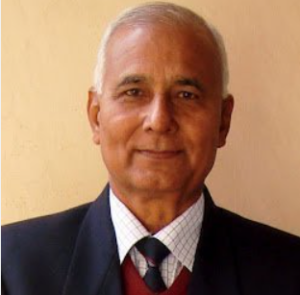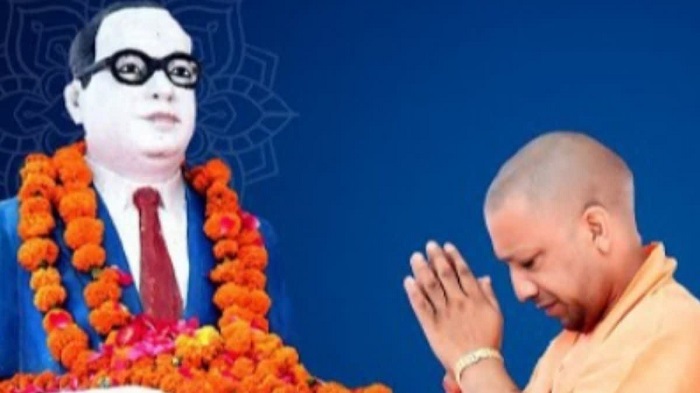What is the compatibility between the ideology of RSS/BJP and Dr. Ambedkar?’
SR Darapuri, National President, All India Peoples Front

(Asian independent) The question of whether the Bharatiya Janata Party (BJP) is attempting to appropriate Dr. B.R. Ambedkar’s legacy through celebrations like Ambedkar Jayanti, and the compatibility between the ideologies of the Rashtriya Swayamsevak Sangh (RSS), BJP, and Ambedkar, is layered and contentious. It requires examining historical context, political strategies, and ideological differences, while staying grounded in observable actions and Ambedkar’s own writings.
Is the BJP Appropriating Dr. Ambedkar’s Legacy?
The BJP, along with other political parties, has prominently celebrated Ambedkar Jayanti (April 14, marking his birth anniversary) in recent years, with events like youth programs, memorials, and public tributes. Since 2014, under Prime Minister Narendra Modi, the BJP has emphasized Ambedkar’s contributions, inaugurating projects like the Dr. Ambedkar International Centre in Delhi (2017) and the Ambedkar National Memorial (2018), and promoting “Panchteerth” sites tied to his life. These actions signal a deliberate effort to associate the party with Ambedkar’s legacy, particularly as a champion of social justice and Dalit empowerment.
Critics argue this is appropriation—a strategic move to consolidate Dalit votes and broaden the BJP’s appeal beyond its traditional upper-caste base. Ambedkar’s stature as the architect of India’s Constitution and a Dalit icon makes him a potent symbol for electoral politics. The BJP’s outreach, including appointing Dalit leaders like Ram Nath Kovind and Droupadi Murmu as Presidents, is seen as an attempt to project inclusivity. However, some view this as superficial, pointing to instances of caste-based violence in BJP-ruled states and policies perceived as diluting affirmative action, like debates over reservation. For example, critics cite the 2018 Supreme Court ruling on the SC/ST Act, which sparked Dalit protests, as evidence of the BJP’s inconsistent commitment to Ambedkar’s ideals.
On the other hand, the BJP claims it is honouring Ambedkar’s vision of national unity and social equality, arguing that its policies align with his emphasis on economic and social upliftment. Supporters point to initiatives like Stand-Up India for SC/ST entrepreneurs and the promotion of Ambedkar’s legacy through education and infrastructure as genuine efforts, not mere tokenism.
Compatibility Between RSS/BJP Ideology and Ambedkar’s Ideology
Ambedkar’s ideology, rooted in equality, liberty, and fraternity, fundamentally challenged caste hierarchies and religious orthodoxy. His key works, like *Annihilation of Caste* (1936) and *Riddles in Hinduism*, critiqued Hinduism’s caste system and Brahmanical dominance. He viewed caste as a structural injustice, advocating its complete abolition, and ultimately rejected Hinduism by converting to Buddhism in 1956, inspiring millions of Dalits to follow. Ambedkar also championed constitutional safeguards, reservations, and state socialism to empower marginalized communities.
The RSS, founded in 1925, and its political arm, the BJP, are rooted in Hindutva, a vision of cultural nationalism that emphasizes Hindu unity and identity. The RSS historically sought to consolidate Hindus across castes under a singular national identity, often prioritizing social harmony over confronting caste hierarchies head-on. Early RSS leaders like M.S. Golwalkar emphasized traditional Hindu values, which some interpret as reinforcing caste norms, though the organization has evolved to advocate social inclusion, partly in response to political realities.
Points of Divergence
- 1. Caste and Hinduism: Ambedkar saw caste as intrinsic to Hinduism’s structure, famously calling it a “veritable chamber of caste horror.” He burned the *Manusmriti* (1927), a text revered in traditional Hindu circles, for justifying caste oppression. The RSS, while opposing untouchability, has historically upheld Hindu scriptures and traditions, creating tension with Ambedkar’s radical rejection of caste-based texts. Critics argue the RSS’s portrayal of Ambedkar as a “Hindu reformer” selectively ignores his critique of Hinduism itself.
- Religious Conversion: Ambedkar’s conversion to Buddhism was a deliberate exit from Hinduism’s caste system. The RSS, however, views Buddhism as an extension of Hindu culture and has historically opposed conversions, as seen in campaigns like *Ghar Wapsi*. This fundamentally clashes with Ambedkar’s belief in religious liberation as a path to equality.
- Social Reform vs. Unity: Ambedkar prioritized dismantling caste through confrontation and legal safeguards, urging Dalits to “educate, agitate, organize.” The RSS emphasizes *sangathan* (organization) for Hindu unity, often sidelining caste-specific grievances to avoid division. This approach can appear to dilute Ambedkar’s focus on systemic change.
- Views on Nationalism: Ambedkar’s nationalism was constitutional, centered on equal citizenship, and skeptical of cultural homogeneity. He criticized the RSS’s Hindu Rashtra concept, warning that a “Hindu Raj” would be a calamity for Dalits. The RSS-BJP’s vision of a Hindu-centric nation, even if inclusive of Dalits, contrasts with Ambedkar’s pluralistic, secular framework.
Points of Convergence (or Claimed Alignment
- Social Inclusion: Since the 1980s, under leaders like Balasaheb Deoras, the RSS has pursued Dalit outreach, running education centres and celebrating Ambedkar’s legacy. The BJP claims its policies, like poverty alleviation and skill development, align with Ambedkar’s goal of economic empowerment, though critics question their depth.
- Anti-Congress Stance: Ambedkar was a fierce critic of the Congress, accusing it of neglecting Dalits (*What Congress and Gandhi Have Done to the Untouchables*). The BJP leverages this to position itself as a truer inheritor of his legacy, contrasting its actions with Congress’s alleged tokenism.
- National Integration: The RSS claims Ambedkar admired its discipline and unity, citing unverified anecdotes like his alleged praise of RSS camps in 1939. While Ambedkar valued national integration, his focus was on equality, not cultural uniformity, making such claims contested.
Historical Context
The RSS’s engagement with Ambedkar evolved over time. In the 1930s-50s, Hindu nationalists viewed him with suspicion for his critique of Hinduism and his 1956 conversion. Post-1980s, as the BJP sought to expand its base amid the Mandal Commission and Congress’s decline, both the RSS and BJP began invoking Ambedkar. This shift intensified under Modi, with symbolic gestures like celebrating Ambedkar Jayanti and resolutions praising his contributions.
However, Ambedkar’s own words complicate these narratives. In *Annihilation of Caste*, he argued that Hindu society’s unity cannot exist without abolishing caste, a challenge the RSS-BJP has not fully embraced. His rejection of Hindutva’s cultural framework, evident in his critique of the *Manusmriti* and conversion to Buddhism, underscores a core incompatibility.
Critical Perspective
The BJP’s celebration of Ambedkar Jayanti appears driven by political pragmatism as much as, if not more than, ideological alignment. Dalits constitute a significant voting bloc (around 16-17% of India’s population), and Ambedkar’s universal appeal makes him indispensable for any party seeking power. The RSS-BJP’s selective focus—highlighting Ambedkar’s nationalism or anti-Congress views while downplaying his anti-Hinduism stance—suggests an attempt to reshape his image to fit Hindutva’s narrative. This risks alienating Dalits who revere Ambedkar’s radicalism, as seen in protests over perceived insults, like the 2024 controversy involving Amit Shah’s remarks on Ambedkar.
Conversely, the BJP’s defenders argue that ideological purity is less relevant than practical outcomes. They claim Ambedkar’s vision of an equitable society is better served by a party in power that can implement policies, however imperfectly, than by opposition rhetoric.
Conclusion
The BJP’s celebration of Ambedkar Jayanti reflects a mix of genuine tribute and strategic appropriation, aimed at electoral gains and countering its upper-caste image. While there are superficial alignments—anti-Congress sentiment, focus on upliftment—the ideological chasm between Ambedkar’s caste-abolitionist, secular vision and the RSS-BJP’s Hindutva framework remains wide. Ambedkar’s rejection of Hinduism’s core texts and his embrace of Buddhism clash with the RSS’s cultural nationalism, making full compatibility elusive. The tension lies in whether symbolic gestures can bridge a divide rooted in fundamentally different views of society and justice.









